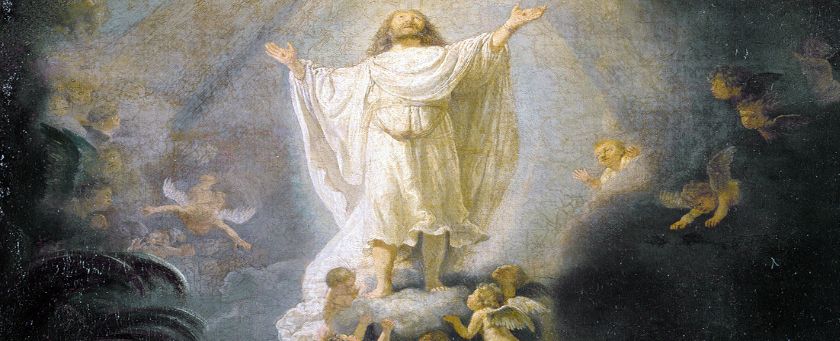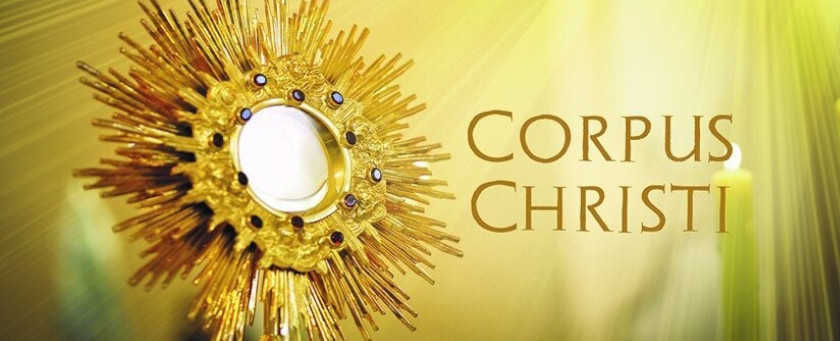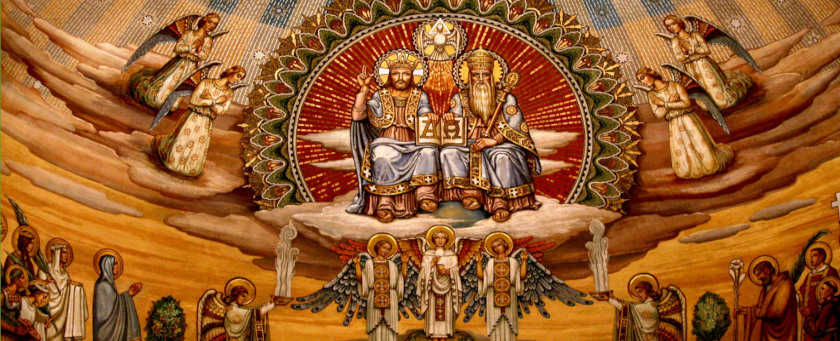I Am Going to My Father and to Your Father
The Ascension of the Lord, Year A

Readings:
Acts 1:1-11; Ps. 47; Ep. 1:17-23; Mt. 28:16-20
(Audio recorded live, 21 May 2023)
Today we celebrate the Ascension of the Lord, the day when Jesus was lifted up by a cloud and taken into heaven where he sits at the right hand of the Father. Last year, our bishop decreed that we will celebrate this solemnity on Sunday instead of Thursday in solidarity with the other dioceses in the province. Traditionally, Ascension Thursday marked the fortieth day of Easter, acting as the bookend to Ash Wednesday, which marks the beginning of the forty days of Lent. The number forty is significant throughout Sacred Scripture, as many will recall that Noah remained in the ark for 40 days, the Israelites wandered the desert for 40 years, and Jesus fasted in the desert for 40 days. The number 40 is symbolic of a time of preparation for something new. Noah was preparing to repopulate the earth, the Israelites were preparing to enter the Promise Land, and Jesus was preparing to battle the Devil and begin his public ministry. We also prepare, liturgically, with 40 days of fasting during Lent, followed by 40 days of reflecting on the Resurrection during Easter. By living out these cycles, we are drawn into the mystery of our faith, namely, Jesus’ passion, death, resurrection, and ascension into heaven.
As Jesus was being taken up, two mysterious men dressed in white appeared and asked the disciples why they were staring at the sky. They said, “This Jesus who has been taken up from you into heaven will return in the same way as you have seen him going into heaven.” In other words, Jesus is the Son of Man, who will return on the clouds as the Scriptures foretell. The time of fulfillment has been satisfied by Jesus, who said on the cross, “It is finished.” And after the Resurrection, he now takes his rightful place on the thrown at the right hand of the Father. St. Paul reiterates this saying, the Father has “put all things beneath his feet and gave him as head over all things to the church, which is his body, the fullness of the one who fills all things in every way.”
Jesus reminds his disciples that they too will receive power when the Holy Spirit comes upon them, and they will be witnesses to the ends of the earth. In the gospel, Jesus gives them the great commission, saying, “Go, therefore, and make disciples of all nations, baptizing them in the name of the Father, and of the Son, and of the Holy Spirit, teaching them to observe all that I have commanded you.” This is one of my favorite passages in Scripture. As St. Paul says in his letter to the Romans, “[H]ow can people preach unless they are sent? As it is written, ‘How beautiful are the feet of those who bring [the] good news!’ … Thus faith comes from what is heard, and what is heard comes through the word of Christ” (Rm. 10:15;17). And so, those who are sent, are commissioned by Christ to teach the good news.
St. Luke constantly highlights the way in which people are filled with the Holy Spirit, how they receive this power from the Most High. The words he uses are the same words as when Mary conceives Jesus in her womb: The Holy Spirit will come upon you, that is, will overshadow you. To receive the power of the Holy Spirit means to receive a share in the Spirit of Christ and to be filled with power. The powers of the Holy Spirit are manifold, but are made known by the mighty deeds of those who receive him. It is no different for us then it was for the disciples. We, too, receive the Spirit first in Baptism, then through Confirmation. Most importantly, the Spirit acts whenever we celebrate the Sacraments, especially the Eucharist. It is by the power of the Spirit that ordinary bread and wine become the Body and Blood of Christ. None of what we celebrate as Catholics would be possible without the action of the Holy Spirit.
And so, as we continue to reflect on the ascension of our Blessed Lord, let us be mindful the many ways the Holy Spirit is active in our lives. Most importantly, let us never forget that it is by the power of the Spirit that Jesus remains with us in the Eucharist, for it was he who said, “Behold, I am with you always, until the end of the age.”





Twitter
Facebook
Pinterest
Email